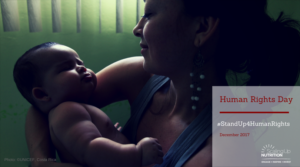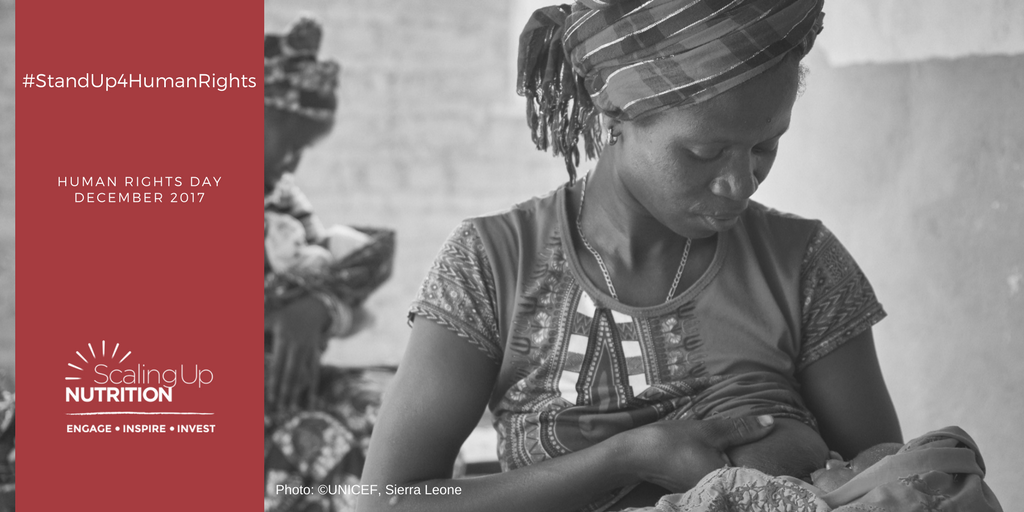Why a Child’s First 1,000 Days Is The Smallest Big Thing For Human Rights
This blog was originally published by the Huffington Post. Access the original article. For us in the Scaling Up Nutrition (SUN) Movement, Human Rights Day, auspiciously marked at the end of each calendar year, offers a perfect opportunity to reflect on where we stand with making sure…
This blog was originally published by the Huffington Post. Access the original article.
For us in the Scaling Up Nutrition (SUN) Movement, Human Rights Day, auspiciously marked at the end of each calendar year, offers a perfect opportunity to reflect on where we stand with making sure that these inalienable rights – including the right to food and nutrition – is something everyone benefits from and that no one is left behind. When the Universal Declaration of Human Rights was drafted – somewhere between 1946 and 1947 – the world looked entirely different than it does today.
At the tail end of the devastating second World War, women and men all over the world were scrambling for freedom and peace, trying to place food, and nutritious food, on the table, to make sure the next generation was healthy and thriving. And, at this time, the notion of everyone being born free and equal – in dignity and rights – was a noble notion. An idea that many (if not most) of us have firmly ingrained in our minds, and, hopefully, our actions – at home, at work and everywhere in between, to great success. We are, after all, healthier, freer and more equal today than ever before.
Over the past year, however, we have seen an increase in hunger, leaving millions on the brink of starvation, due to conflict and climate-related shocks. This makes me wonder if we are moving one step forward and two steps back regarding ensuring human rights for all, as the famines we today see in countries such as Nigeria, Yemen, Somalia and South Sudan are described as the worst humanitarian crisis since the above-mentioned War.
As Eleanor Roosevelt (this essential Declaration’s mother) once said, “Where, after all, do universal human rights begin? In small places, close to home — so close and so small that they cannot be seen on any maps of the world. […] Unless these rights have meaning there, they have little meaning anywhere. Without concerted citizen action to uphold them close to home, we shall look in vain for progress in the larger world.” To us, this is more relevant today than, perhaps, ever.
For the SUN Movement – which has 60 countries and three Indian States in the driver’s seat – the right to food, nutrition and an adequate standard of living (as per Article 25 of the Declaration), begins in the smallest big place I know: when a girl or boy is conceived. This moment, and the 1,000 days that follow, make all the difference in whether a child has the opportunity to actualize their equality and freedom. And how can we expect these girls and boys to compete with those who did receive the right nutrition from the get-go, to nurture the body and brain alike? So, no, we are not all born free and equal – necessarily.
Luckily, it is not all doom and gloom for us and for generations to come. Our Annual Progress Report, launched at the 2017 SUN Movement Global Gathering held last month, shows us that ending malnutrition is within reach, for children and their parents. In the past year, countries including Burkina Faso, Ethiopia, Mauritania, Myanmar and Nigeriahave reported a reduction in stunting. Globally, the number of children too short for their age has decreased from 165 million in 2012, to 155 million today. This means that, for many girls and boys, they too, get to be born into a world – in dignity and rights – where they are cognitively and physically fit to be the leaders of tomorrow.
Our progress report also shows us that the recognition of the right to food and nutrition in constitutions provides the necessary grounding to ensure nutrition is an enduring rather than fleeting priority. Across the Movement, 24 SUN Countries explicitly or implicitly mention this fundamental right in their constitutions, with ten SUN Countries explicitly protecting this right. Countries such as Uganda have opted not to mention the right to food, as such, in their constitution, but, rather, focus on the right to good nutrition.
 Which brings me to my last point, as we embark on a year-long celebration of the Universal Declaration of Human Rights’ seventieth anniversary. We know that healthy food and good nutrition fuels the body and brain so we can perform well at work and at home. Yet, is this food, the food that we have a right to, necessarily healthier than the food my parents were served? Some studies point to a worrisome trend, such as one from 2005 [1], which argues that a chicken served in the UK in 2004 contained more than twice as much fat as in 1940, a third more calories and a third less protein. This change in the quality and nutritional value of food produced and served could explain the ticking ‘time bomb’ that is the global and unprecedented scale of overweight and obesity. Luckily, many countries around the world are more cognizant of this and are putting in place national policies to ensure nutritious foods.
Which brings me to my last point, as we embark on a year-long celebration of the Universal Declaration of Human Rights’ seventieth anniversary. We know that healthy food and good nutrition fuels the body and brain so we can perform well at work and at home. Yet, is this food, the food that we have a right to, necessarily healthier than the food my parents were served? Some studies point to a worrisome trend, such as one from 2005 [1], which argues that a chicken served in the UK in 2004 contained more than twice as much fat as in 1940, a third more calories and a third less protein. This change in the quality and nutritional value of food produced and served could explain the ticking ‘time bomb’ that is the global and unprecedented scale of overweight and obesity. Luckily, many countries around the world are more cognizant of this and are putting in place national policies to ensure nutritious foods.
What this tells us is as follows: Yes, most of us are better off in 2017 than we were in 1948 – in that many more know the importance of food that is good for us, at every stage of the life cycle, starting from conception. And that is no small thing. But there is still a long way to go – in every corner of the world. We all have a key role in this, and there is no time better than today to #StandUp4HumanRights and truly lead from where we stand. And with this, I wish you the healthiest and most nutritious end to the year.
[1] The Guardian (2005). It’s supposed to be lean cuisine. So why is this chicken fatter than it looks? Available at: www.theguardian.com/lifeandstyle/2005/may/15/foodanddrink.shopping3 [accessed December 2017].
